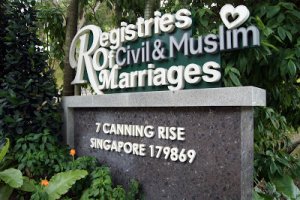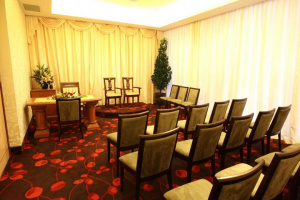Getting married in Singapore (Muslim marriages)
For information on civil marriages in Singapore, see Getting married in Singapore.
Couples in Singapore are allowed to get married at the age of 21. However, registration of marriage for individuals between 16 to 21 years of age is also accepted with the consent of parents or guardians. Muslim marriages in Singapore should be legally registered at the Registry of Muslim Marriage (ROMM). While civil marriages in Singapore are governed by the civil law of Singapore, Muslim marriages are governed by Syariah law. In general, the process of getting married in Singapore can be broken down into 2 parts, namely the application for marriage and solemnisation.
Registry of Marriages (ROM)
In order for a marriage to be legally recognised in Singapore, couples must register and their marriage through the Registry of Marriages (ROM). The building housing the Registries of Civil and Muslim Marriages in Singapore is located at 7 Canning Rise. Since its official opening in 1983, the building has undergone 2 major facelifts in 2000 and 2011 to improve the experience of couples.[1] The ROM also provides basic solemnisation services for both civil and muslim marriages on a first come first served basis. The closest MRT stations to ROM are Bras Basah (CC2) and City Hall (EW13/NS25).
Eligibility requirements
Before registering for marriage, individuals have to meet the requirements as stipulated by the matrimonial law of Singapore. Couples of 21 years old and above are allowed to register for marriage at their own will. Polygynous marriage, where a man has multiple wives, is allowed for Muslim marriages. However, this can only be done with the Kadi’s approval.[2] A Kadi is a state-appointed religious official with the ability to carry out solemnisations. The Kadi will arrange for separate interviews with the first wife and husband. Approval will be granted only after reviewing the information presented at the interviews.
Minors between the age of 16 to 20 are not allowed to register for marriage unless with the Statement of Parental/Guardian Consent.[3] They have to be accompanied by both parents for a interview with the Kadi or Naib Kadi before proceeding with the registration. Minors are also required to complete a compulsory Marriage Preparation Programme at the INSPIRASI Hubs approved by the Ministry of Social and Family Development.[4] The two INSPIRASI Hubs are located at Bukit Batok and Pasir Ris with the closest MRT stations being Bukit Gombak (NS3) and Pasir Ris (EW1) respectively.
Application for marriage
Before filing a notice for marriage, couples are required to confirm the details of their Hantaran and Maskahwin.The Hantaran is a marriage gift usually in the form of cash and/or material gifts such as bags or shoes. The Hantaran is exchanged between the families of the bride and groom. The Maskahwin is a compulsory marriage gift which is given by the groom to the bride, as a symbolism for his responsibility as a husband. It can be in the form of cash or other valuable goods like gold and silver. The value of of the Maskahwin should not be below SGD$100.[5]
Notice for Marriage
The application for marriage is mostly an online process. Couples must submit a “Notice of Marriage” via ROMM’s online platform (ROMM e-filing service). The documents required for filing a Notice of Marriage are as such:
- Credit card
- NRIC/Passport of bride, groom, Wali and parents/guardians (if the applicant is a minor)
- Statement of Parental/Guardian Consent For The Marriage of a Minor
- Certificate of completion of the Marriage Preparation Programme (MPP)
Within 3 working days of filing the Notice for Marriage, the couple must be present at the ROMM premises for a Verification of Documents and Statutory Declaration (VD/SD) appointment.[6] Hence, if a couple filed for marriage on a Friday (18 January) the latest appointment day would be the following Wednesday (23 January). The bride, groom, and Wali are required to attend the VD/SD appointment. A Wali is a male relative from the bride’s paternal family who was responsible for the bride’s life before marriage. In most cases, a bride’s lawful Wali would be her father.
Solemnisation
The official solemnisation will only occur after the VD/SD appointment. The bride, groom, Wali, 2 male witnesses and the Kadi or Naib Kadi must be present during the solemnisation. Like other registered solemnisers, the Kadi is not paid for his services. However, it is standard practice for couples to give their solemniser a token of appreciation. Couples may choose their preferred Kadi from a list of registered individuals on the ROMM website.[7]
Ceremony
The exchange of Hantaran between the bride and groom’s families will take place before the solemnisation procedure begins. During the ceremony, the Kadi or Naib Kadi will conduct the solemnisation and the groom will have to read the marriage conditions. Prayers will be said by the Kadi or Naib Kadi before the groom passes the Maskahwin to his bride. At the end of the ceremony, the marriage certificate will be collected as the couple is pronounced man and wife.
Fees
The marriage fee for Muslim marriages where at least one individual is a Singaporean or a permanent resident is SGD$39.00. This fee is inclusive of a solemnisation venue in ROM. This fee does not include the expenses on the Maskahwin (minimum SGD$100.00) and the Hantaran. As such, a couple can expect to spend a minimum of SGD$139.00 when applying for a marriage in Singapore. Couples who are both foreigners are expected to pay a marriage fee of SGD$128.00. Additional fees for other common services are as follows:[8]
| Services (Muslim Marriage) | Costs (SGD) |
| Marriage without Wali’s consent | $100.00 |
| Marriage for under 21 years old | $120.00 |
| Search for marriage record | $35.00 |
| Copy of Marriage Certificates | $40.00 |
| Change of solemnisation details | $15.00 |
References / Citations
- ↑ “About ROM”. Last updated on March 5, 2018. Accessed on 14 January 2019. Retrieved from: https://www.rom.gov.sg/about_rom/rom_about.asp
- ↑ “Polygyny”. Registry of Muslim Marriages (Singapore). Last updated on October 5, 2018. Accessed on 15 January 2019. Retrieved from: https://www.romm.gov.sg/about_marriage/romm_polygyny.asp
- ↑ “Requirements for Application for Marriage in ROMM (18-20 years)”. Registry of Muslim Marriages (Singapore). October 10, 2018. Accessed on 7 January 2019. Retrieved from: https://www.romm.gov.sg/about_marriage/romm_eligibility_18.asp
- ↑ “Workflow for minor couples where at least one party is 18 to 20 years old (with effect from 22 oct 2018)”. Registry of Muslim Marriages (Singapore). October 10, 2018. Accessed on 7 January 2019. Retrieved from: https://www.romm.gov.sg/resources/pdf/Guideline-Minor%20Marriage.pdf
- ↑ “Maskahwin and Marriage Expenses”. Registry of Muslim Marriages (Singapore). Last updated on April 2, 2015. Accessed on 15 January 2019. Retrieved from: https://www.romm.gov.sg/about_marriage/romm_maskahwin_expenses.asp
- ↑ “Eligibility”. Registry of Muslim Marriages (Singapore). Last updated on September 21, 2018. Accessed on 15 January 2019. Retrieved from: https://www.romm.gov.sg/about_marriage/romm_eligibility.asp
- ↑ “Kadi & Naib Kadi”. Registry of Muslim Marriages (Singapore). Last updated on April 2, 2015. Accessed on 15 January 2019. Retrieved from: https://www.romm.gov.sg/about_marriage/romm_kadi.asp
- ↑ “Registration & Solemnisation Fee”. Registry of Muslim Marriages (Singapore). Last updated on October 5, 2018. Accessed on 15 January 2019. Retrieved from: https://www.romm.gov.sg/about_marriage/romm_registration_fee.asp

